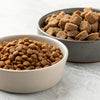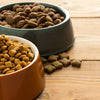Which Dry Dog Food Do Vets Recommend? A Comprehensive Guide for Pet Owners
- Houndsy
Table of Contents
- Introduction
- Understanding Dog Nutrition
- Factors Influencing Vet Recommendations
- Top Vet-Recommended Dry Dog Foods
- Transitioning to New Dog Food
- Conclusion
- Frequently Asked Questions (FAQs)
Introduction
Did you know that nearly 60% of dogs in the United States are overweight or obese? This alarming statistic highlights the importance of proper nutrition in our furry friends' lives. When it comes to choosing the right dry dog food, the options can be overwhelming, with countless brands and formulations flooding the market. As responsible pet owners, we want to ensure that our beloved companions receive the best nutrition possible.
In this blog post, we will delve into the question: which dry dog food do vets recommend? We aim to equip you with knowledge about what to look for in dog food, factors influencing a vet’s recommendations, and a curated list of top-rated dry dog food options recommended by professionals in the field. By the end of this article, you'll have a clearer understanding of how to make informed decisions for your pet's diet.
We'll cover essential aspects such as nutritional requirements for dogs, what makes a dry dog food brand stand out, and specific recommendations from veterinarians. So, let’s embark on this journey to enhance our dogs' feeding experience, ensuring it’s not only convenient but also nurturing.
Understanding Dog Nutrition
Before we dive into specific food recommendations, it’s essential to grasp the fundamental nutritional needs of dogs. A complete and balanced diet is one that provides all the necessary nutrients to maintain health, support growth, and prevent disease.
Key Nutritional Components
- Protein: This is crucial for muscle growth, tissue repair, and overall health. Animal-based proteins such as chicken, beef, and fish should be the primary source.
- Fats: Healthy fats are important for energy, skin health, and the absorption of fat-soluble vitamins. Omega-3 and Omega-6 fatty acids are especially beneficial for maintaining a shiny coat.
- Carbohydrates: While dogs are primarily carnivorous, carbohydrates can provide a good source of energy. Whole grains and vegetables help maintain digestive health.
- Vitamins and Minerals: Essential for immune function, bone health, and overall well-being, vitamins like A, E, and D, as well as minerals such as calcium and phosphorus, must be included in a dog's diet.
- Water: Though not a dietary component, it's vital for hydration, digestion, and nutrient absorption. Always ensure your dog has access to fresh water.
AAFCO Standards
When selecting dog food, look for products that meet the standards set by the Association of American Feed Control Officials (AAFCO). This organization ensures that pet foods are nutritionally complete and balanced according to specific life stages (puppy, adult, senior).
Factors Influencing Vet Recommendations
Veterinarians consider several factors when recommending dry dog food. These include:
1. Dog’s Age and Breed
Different life stages—puppy, adult, and senior—require specific nutritional profiles. Additionally, small and large breeds may have varying dietary needs based on their size, metabolism, and activity level.
2. Health Conditions
If a dog has health issues such as allergies, obesity, or diabetes, a vet may recommend specific formulations that cater to those conditions. For instance, a low-calorie diet may be suggested for weight management.
3. Ingredient Quality
Veterinarians often emphasize the importance of high-quality ingredients. Foods that list specific named meats (e.g., "chicken" vs. "meat by-products") and avoid artificial additives and fillers are generally preferred.
4. Brand Reputation
Brands with a history of transparency, quality control, and positive feedback from pet owners and veterinarians tend to be recommended more often.
5. Palatability
A food that your dog enjoys will ensure they eat the necessary nutrients. Vets often consider palatability when recommending products, as a dog’s willingness to eat is crucial for their overall health.
Top Vet-Recommended Dry Dog Foods
With a better understanding of dog nutrition and the factors influencing veterinarians' recommendations, let's explore some of the best dry dog food options that vets commonly endorse.
1. Royal Canin
Overview: Recognized for its breed-specific formulas, Royal Canin tailors its recipes to meet the unique needs of various breeds, ages, and health conditions.
Key Features:
- Offers both dry and wet options
- Special formulas designed for specific breeds
- High-quality animal protein sources
Vets Say: Many vets recommend Royal Canin for its scientific approach to nutrition, emphasizing that it meets AAFCO standards for complete and balanced diets.
2. Hill’s Science Diet
Overview: Hill’s focuses on scientifically formulated diets that cater to all life stages and specific health needs.
Key Features:
- Made with high-quality ingredients
- Contains essential fatty acids for skin and coat health
- Formulated by veterinarians and nutritionists
Vets Say: This brand is often recommended for its proven results in improving pet health and longevity.
3. Purina Pro Plan
Overview: Purina Pro Plan offers a variety of specialized formulations for different breeds and health needs, including weight management and sensitive stomachs.
Key Features:
- High protein content for active dogs
- Fortified with live probiotics for digestive health
- Variety of flavors to cater to different palates
Vets Say: Many vets appreciate Purina Pro Plan for its affordability and effectiveness, particularly for performance dogs.
4. Merrick Grain-Free Recipe
Overview: Merrick specializes in grain-free dog food options that focus on high protein and whole foods.
Key Features:
- Real, whole meat as the first ingredient
- Free from artificial preservatives and fillers
- Variety of flavors, including beef, chicken, and salmon
Vets Say: Vets often recommend Merrick for dogs with food sensitivities due to its limited ingredient formulations.
5. Open Farm
Overview: Open Farm emphasizes sustainability and traceability in its ingredients, making it a popular choice among eco-conscious pet owners.
Key Features:
- Humanely sourced and sustainable ingredients
- Variety of protein options
- Free from artificial additives
Vets Say: Many veterinarians endorse Open Farm for its commitment to quality and ethical sourcing.
6. Canidae
Overview: Canidae offers a range of holistic dog foods that are formulated to provide optimal nutrition for various life stages.
Key Features:
- High protein content from multiple sources
- Grain-free options available
- Nutrient-dense recipes that promote overall health
Vets Say: Canidae is often recommended for its focus on high-quality ingredients and balanced nutrition.
7. Orijen
Overview: Known for its biologically appropriate formulas, Orijen focuses on high protein and fresh ingredients.
Key Features:
- High meat content with fresh, regional ingredients
- Grain-free and low-glycemic options
- Variety of flavors and formulations
Vets Say: Vets appreciate Orijen for its premium ingredients and commitment to a natural diet.
Transitioning to New Dog Food
When switching your dog’s food, it’s important to do so gradually to avoid gastrointestinal upset. Here’s a simple transition plan:
- Days 1-3: Mix 25% new food with 75% old food.
- Days 4-6: Mix 50% new food with 50% old food.
- Days 7-10: Mix 75% new food with 25% old food.
- Day 10 onwards: Feed 100% new food.
Conclusion
Choosing the right dry dog food is an essential aspect of maintaining our canine companions' health and well-being. By understanding the nutritional needs of dogs and considering the factors that influence veterinary recommendations, we can make informed choices that support their growth and happiness.
Ultimately, the best dry dog food will depend on your dog's specific needs, preferences, and any health considerations. We encourage you to consult with your veterinarian for personalized guidance tailored to your furry friend.
As you explore options for your dog’s feeding experience, consider integrating the Houndsy Kibble Dispenser into your routine. Our innovative design not only elevates the feeding ritual but also ensures that feeding is consistent and beautiful, complementing your home decor. Discover how the Houndsy Kibble Dispenser can simplify your daily pet care by visiting our product page here.
Frequently Asked Questions (FAQs)
Q1: What should I look for in dry dog food?
When selecting dry dog food, check for high-quality protein sources, AAFCO approval, absence of artificial additives, and the specific nutritional needs of your dog based on their age and health conditions.
Q2: How much dry dog food should I feed my dog?
The amount depends on your dog’s weight, age, and activity level. Always refer to the feeding guidelines on the packaging and consult your veterinarian for personalized recommendations.
Q3: Can I mix dry and wet dog food?
Yes, many pet owners mix dry and wet food to enhance palatability and provide moisture to their dog’s diet. Just ensure both types meet your dog’s nutritional needs.
Q4: How can I tell if my dog is overweight?
You can assess your dog's weight by feeling their ribs. If you can easily feel them without excess fat covering, your dog is likely at a healthy weight. Consult your vet for an accurate assessment.
Q5: Is grain-free dog food better for my dog?
Grain-free diets are not necessarily better unless your dog has a specific grain allergy or sensitivity. Always consult with your veterinarian to determine the best diet for your dog’s health.
By understanding which dry dog food vets recommend and why, we can ensure that our furry friends receive the best care possible. Here’s to happy feeding times and healthy, joyful pups!












